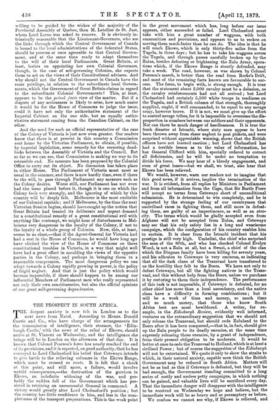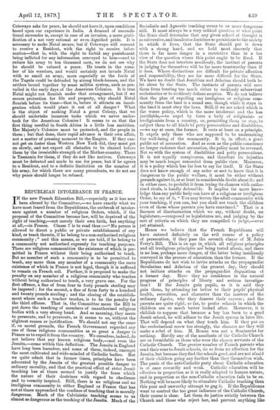1H] PROSPECT DT SOUTH AFRICA. T HE deepest anxiety is now
felt in London as to the next news from Natal. According to Messrs. Donald Currie and Co., who have charge of the arrangements for the transmission of intelligence, their steamer, the Edin- burgh Castle,' with the news of the relief of Ekowe, should arrive at St. Vincent on Wednesday, and the intelligence she brings will be in London on the afternoon of that day. It is known that Colonel Pearson's force has nearly reached the end of its provisions, and it is reported, on good authority, that he has conveyed to Lord Chelmsford his belief that Cetewayo intends to give battle to the relieving columns in the Ekowe Range, which must be crossed en route. It is felt that a check at this point, and still more, a failure, would involve untold consequences,—the destruction of the garrison in Ekowe, an indefinite widening of the war, and pro- bably the sudden fall of the Government which has per- sisted in retaining an unsuccessful General in command. A victory would greatly alter Lord Chelmsford's position ; but the country has little confidence in him, and less in the com- pleteness of the transport preparations. This is the weak point in the great movement which has, long before our issue appears, either succeeded or failed. Lord Chelmsford must take with him a great number of waggons, with both ammunition and provisions, and appears to us to reckon on moving them much faster than he can do. The idea is that he will reach Ekowe, which is only thirty-five miles from the Tugela, in three days ; but he has to take his waggons across the Tugela, and through passes carefully broken up by the Zulus, besides defeating or frightening the Zulu Army, opera-, tions which, if the Ekowe Range is stoutly defended, may take a week. The road, however, as was shown by Colonel Pearson's march, is better than the road from Rorke's Drift, and most of the remaining facts known are favourable to suc- cess. The force, to begin with, is strong enough. It is true that the statement about 2,000 cavalry must be a delusion' as the cavalry reinforcements had not all arrived; but Lord Chelmsford had certainly 5,500 white troops in readiness on the Tugela, and a British column of that strength, thoroughly supplied, ought, if well commanded, to be equal to any savage army, however brave. If it is not, we must give up the effort to control savage tribes, for it is impossible to overcome the dis- proportion in numbers between our soldiers and their opponents. Nor can there be much danger of heedlessness. It is true the fresh disaster at Istombi, where sixty men appear to have been thrown away from sheer neglect to post pickets, and were surprised without appreciable warning, shows that the British officers have not learned caution ; but Lord Chelmsford has had a terrible lesson as to the value of information, he has General Clifford with him, specially ordered to correct all deficiencies, and he will be under no temptation to divide his force. We may hear of a bloody engagement, and even of great losses—but we shall, we trust, also hear that Ekowe has been relieved.
We would, however, warn our readers not to imagine that this good news, if it arrives, implies the termination of the war. It is evident, from all replies by Ministers in Parliament and from all information from the Cape, that Sir Bartle Frere will accept no terms from Cetewayo short of unconditional submission. He is determined to win completely, and he is supported by the strange feeling of our countrymen that uncivilised races in fighting them, and still more in defeat- ing them, are guilty of an impertinence, as well as an atro- city. The terms which would be gladly accepted even from Afghans will not be accepted from Zulus, and Gateway° may see that his only safety lies in a long and wearisome campaign, which the configuration of his country enables him to sustain. It is clear from the Istombi incident that his prestige is still very high. Umbelini, the chief who surprised the men of the 80th, and who has checked Colonel Evelyn Wood, is not a Zulu at all, but a Swazi, a chief of the clan which. the Dingaan family have been killing for seventy years, and his adhesion to Cetewayo is very ominous, as indicating that all the dark clans of the Transvaal have transferred to us the hostility they felt to the Boers. We have not only to defeat Cetewayo, but all the fighting natives in the Trans- vaal., and this without help from the Boers, unless we purchase it by restoring to them their independence. The performance of this task is not impossible, if Cetewayo is defeated, for no other chief has more than a local ascendancy, and the native clans have a difficulty in forming combinations ; but it will be a work of time and money, so much time and so much money, that those who know South Africa best are most bewildered. A writer, for ex- ample, in the Edinburgh Review, evidently well informed, ventures on the extraordinary suggestion that we should not only release the Transvaal, but should cede Zululand to the Boers after it has been conquered,—that is, in fact, should give up the Zulu people to its deadly enemies, at the same time expressly releasing those enemies, by a grant of independence, from their present obligation to be moderate. It would be better at once to cede the Transvaal to Holland, which is at least a civilised Power ; but of course the suggestion of the Edinburgh will not be entertained. We quote it only to show the straits to which, in their natural anxiety, capable men think the British Government may be reduced in South Africa. Matters will not be as bad as this if Cetewayo is defeated, but they will be bad enough, the Government standing committed to a long series of costly and useless petty campaigns, in which nothing can be gained, and valuable lives will be sacrificed every day. That the immediate danger will disappear with the intelligence to be received on Wednesday we hope and believe, but the immediate work will be as heavy and as peremptory as before. We confess we cannot see why, if Ekowe is relieved, and Cetewayo asks for peace, he should not have it, upon conditions based upon our experience in India. A demand of uncondi- tional surrender is, except in case of an invasion, a mere grati- fication of a not very rational or even dignified pride. It is necessary to make Natal secure, but if Cetewayo will consent to receive a Resident, with the right to receive infor- mation—that is, with the right to forbid any punishment being inflicted for any information conveyed to him—and to reduce his army to ten thousand men, we do not see why he should be refused a peace. He trusts in the num- ber of his warriors, and would certainly not invade Natal with so small an army, more especially as the fords of the Tugela could be defended by strong block-houses, and the settlers bound together by some militia system, such as pre- vailed in the early days of the American Colonies. It is true Natal might not flourish under that arrangement, but if we secure protection for life and property, why should Natal flourish before its time—that is, before it attracts an immi- gration which would place it out of all danger ? What is the object of making Natal a great Colony, that we should undertake immense tasks which we never under-. took for the American Colonies ? It seems to us that the first thing needful in South Africa is a little less ambition. Her Majesty's Colonies must be protected, and the people in them ; but that done, their rapid advance is their own affair, not a matter of pressing moment to the Empire. If they can- not get on faster than Western New York did, they must get on slowly, and not expect all obstacles to be cleared before them by the irresistible strength of the Mother-country. There is Tasmania for them, if they do not like natives. Cetewayo must be defeated and made to sue for peace, but if he agrees to a Resident, and to a definite limitation on the number of his army, for which there are many precedents, we do not see why peace should longer be refused.



































 Previous page
Previous page